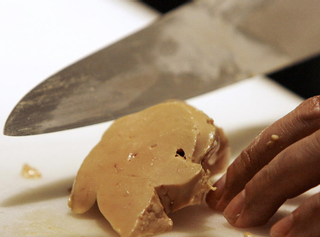
Podcast: Play in new window | Download (Duration: 22:57 — 18.7MB)
Subscribe: Google Podcasts | Spotify | Android | RSS | More
 Any way you slice it, foie gras — the fatty liver of a duck or goose — is a fighting matter. To animal rights activists it is quite obviously cruel and depraved. To many chefs and eaters, it is a delicious extravagance. To many other chefs and eaters, it is something they would rather not countenance. To the vast majority of French people, it is a symbol of their nation and an essential part of their identity, the rare product of smiling rustic grandmothers, making a bit of pin money on the side. And for the industrial producers responsible for 90% of French foie gras, those rustic grandmothers are icons of perfect marketing.
Any way you slice it, foie gras — the fatty liver of a duck or goose — is a fighting matter. To animal rights activists it is quite obviously cruel and depraved. To many chefs and eaters, it is a delicious extravagance. To many other chefs and eaters, it is something they would rather not countenance. To the vast majority of French people, it is a symbol of their nation and an essential part of their identity, the rare product of smiling rustic grandmothers, making a bit of pin money on the side. And for the industrial producers responsible for 90% of French foie gras, those rustic grandmothers are icons of perfect marketing.
The whole foie gras story — which is by no means over yet — offers a fascinating insight into the role of politics in food — which happens to be the subtitle of a new book by Michaela DeSoucey, a sociologist who got caught up in foie gras just before the topic exploded all over the food scene in Chicago.
In this episode, we talked about just a few of the things that make foie gras such a special topic.
Notes
- Michaela DeSoucey’s book is Contested Tastes: foie gras and the politics of food, published by Princeton University Press.
- There has been an awful lot written about foie gras in America, more than I care to link to here. But the Chicago Tribune did publish a look back at what they called Chicago’s foie gras fiasco. I took the cover photo from there.
- If you want some straight talk on foie gras, and how to prepare it from scratch, you could do worse than visit Peter Hertzmann’s website.
- Banner photo of Chef Doug Richey (c) Heather Irwin.
- And the music? Sonata IV in C Major for Trumpet and Strings by Heinrich Ignaz Franz von Biber.

Here we go again, with New York City set to ban foie gras. https://newfoodeconomy.org/new-york-city-foie-gras-ban-gavage/
Nothing has changed that I can see, since I spoke to Michaela DeSoucey a few years ago. https://www.eatthispodcast.com/foie-gras/